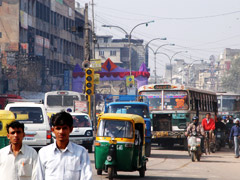- Home
- About JICA
- President's Desk
- Former President's Visits & Remarks
- OGATA Sadako
- JICA President Outlines Relations between India and Her Agency
OGATA Sadako
March 9, 2007
JICA President Outlines Relations between India and Her Agency

Even as JICA undergoes a major restructuring, decades old relations with India are continuing to strengthen, President Sadako Ogata told a Japan-India symposium Friday (March 9).
In a keynote speech she said that a rapidly globalizing world only added to the urgency of finding new, innovative solutions to help millions of the world's neediest people including a so-called 'human security' approach ensuring local communities have greater control over their own futures.
Mrs. Ogata was on her first official visit to India and during a 10-day stay she was meeting Japanese and Indian government and cooperation officials and visiting projects around India which highlight JICA's emphasis on poverty reduction, economic and infrastructure development and environmental protection.
In her symposium speech Mrs. Ogata recalled more than 40 years of close cooperation between the two countries and then discussed future changes in Japan's Official Development Assistance (ODA) and the effect on bilateral cooperation.
JICA itself, she said, is undergoing fundamental change, including integrating with that part of the Japan Bank for International Cooperation (JBIC) which currently disburses yen loans to developing countries.
When the restructuring is completed in 2008 the 'New JICA' will effectively not only provide technical cooperation with nations around the world, as it currently does, but will also be able to approve yen loans and substantial portions of grant aid currently disbursed by the Japanese Ministry of Foreign Affairs.
The restructuring she said will make JICA "more streamlined, more efficient and more effective in meeting its global goals" and able to provide cooperation, grant aid and yen loans "all under one roof."
"This reorganization is occurring at a propitious time in Japanese-Indian relations," she said in remarks prepared for the seminar. "Our ties are strengthening and moving onto a higher level."
She added: "The 'New JICA' will be able to meet more challenging goals at both ends of the developmental scale…helping some of the world's poorest people and individual communities to improve their everyday lives, but also being involved in large-scale development programs to boost the country's entire economic performance."
Her organization is emphasizing a 'human security' approach to projects, Mrs. Ogata said, and today's rapidly globalizing world only added urgency to this shift.
Human security was a "simple concept which incorporates two mutually reinforcing approaches," the JICA President told delegates, "the so-called 'bottom-up' and then 'top-down' approaches, both dedicated to improving people's basic lives."
'Bottom-up' involved a grass-roots or local community approach with the overall aim of empowering people themselves to directly improve their lives, promoting their abilities in such fields as education, health care, social safety nets and access to jobs.
The 'top-down' approach embraced the more traditional concept of development assistance, emphasizing the importance of protecting people, their safety, basic rights and freedoms by governments and other, larger national bodies and supporting programs to strengthen these systems.
"Money, goods, information and people but also diseases, natural disasters and economic downturn are no respecters of borders or states' rights anymore," she said. "'But people who are empowered through education, health care, as well as participation in public life, will be better equipped to deal with these increasing threats at their local levels."
She noted that in addition to JICA, United Nations humanitarian and developmental agencies had also embraced the concept of 'human security.'
Among the projects she was visiting during her tour which ends March 16 were ones to improve Delhi's rapid transport system, silk production, forest resource management, water supply and sewerage and a major program to upgrade India's vital rail system.
- About JICA
- News & Features
- Countries & Regions
- Our Work
- Thematic Issues
- Types of Assistance
- Partnerships with Other Development Partners
- Climate Change / Environmental and Social Considerations
- Evaluations
- Compliance and Anti-corruption
- Science and Technology Cooperation on Global Issues
- Research
- JICA Development Studies Program / JICA Chair
- Support for the Acceptance of Foreign HRs / Multicultural and Inclusive Community
- Publications
- Investor Relations
